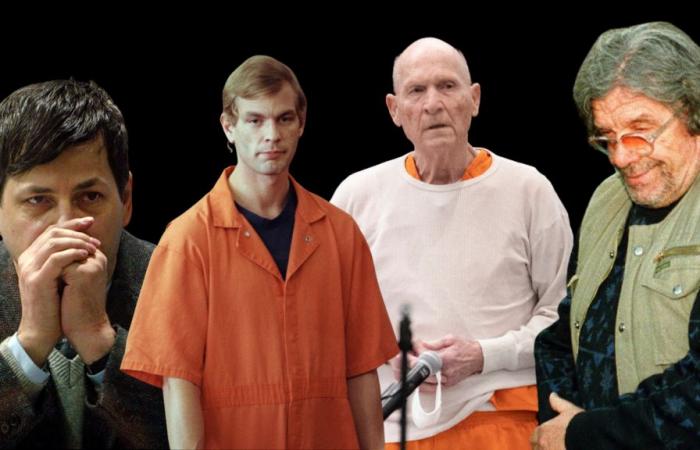
Dutroux, Dahmer, the Golden State Killer and Andras Pandy. © Belga Image
The fascination with serial killers goes back well before streaming platforms and successful series like those about Dahmer or Ted Bundy. As early as the 19th century, figures like Jack the Ripper were already captivating the popular imagination through the press. Even today, millions of spectators immerse themselves in the sordid episodes of these criminals, oscillating between fascination and fear. But despite this persistence in popular culture, the numbers show a startling reality: the golden age of serial killers seems behind us.
In the 1980s, it was estimated that nearly 770 serial killers were active in the United States. This number dropped to around 670 in the 1990s and rose to 400 between 2000 and 2010. Today, experts agree that these numbers are around only a few dozen. For example, the Golden State Killer, arrested in 2018, almost represents an anomaly in a context where arrests for this type of crime are becoming rare.
The three main reasons
One of the main reasons is the evolution of survey technologies. In the 1970s and 1980s, the lack of DNA testing, surveillance cameras and cooperation between police departments allowed criminals to commit crimes without being worried. Today, the slightest trace of DNA can be traced back to a suspect within days, and omnipresent surveillance cameras make anonymity almost impossible.
At the same time, alarming behaviors, such as animal cruelty or extreme isolation, are now detected earlier. THE psychiatric carealthough far from perfect, have progressed, thus reducing the possibility for certain profiles to take action.
The sociologist Laurent Denave also highlights the link between social conditions and homicides. The 1970s and 1980s, marked by strong precariousness in the United States, were in fact a period conducive to the emergence of these criminals. With economic conditions generally improving since then, these phenomena are becoming rarer.
The typical profile of the serial killer
Other patterns should be noted. The typical serial killer is often a white man, aged 30 to 40, having grown up in a precarious environment and marked by childhood abuse. Many suffer from personality disorders, such as psychopathy, and feel no empathy. Contrary to the image of the Machiavellian genius, most are not particularly intelligent. For some, murder responds to an uncontrollable impulse; for others, it is a quest for power or revenge.
Very Belgian serial killers
If we often associate serial killers with the United States, some are rampant here too. In Belgium, the most famous serial killer remains Marc Dutroux. We also remember the Skinner of Mons. But other less famous cases are worth citing. Andás Pándy, for example, a Protestant pastor, was convicted of the murder of six people, in complicity with his own daughter. Investigators even found the teeth of eight other potential victims in his cellar, bringing the total number to 14.
The days of serial killers appear to be over, thanks to a combination of technological, social and economic factors. However, these figures continue to haunt the collective imagination, reminding us that evil, although in decline, never completely disappears.





